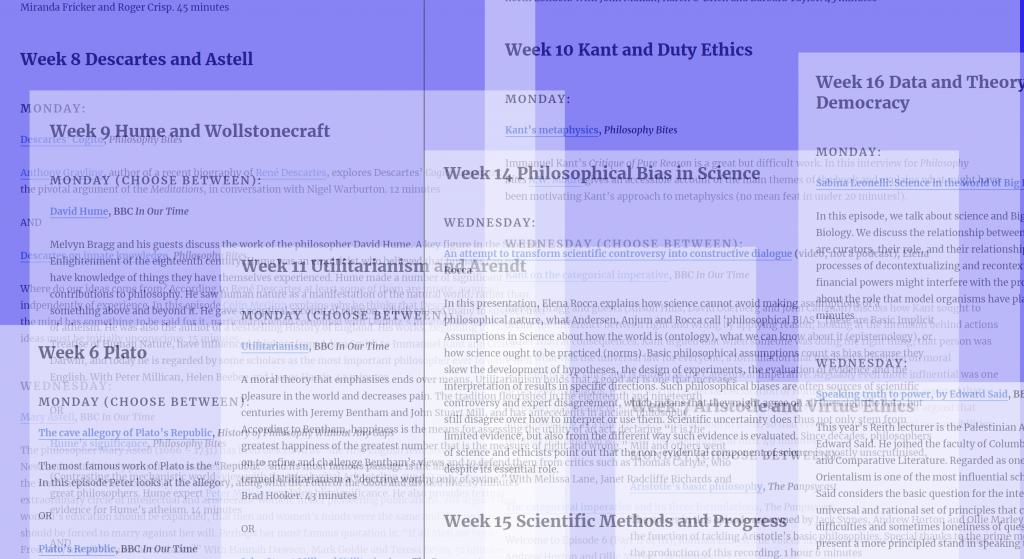An Intro Philosophy Course that Uses Podcasts Instead of Readings
Rani Lill Anjum, research fellow in philosophy at Norwegian University of Life Sciences, is trying something new with her introductory philosophy course this term: she has replaced all of the readings with podcasts.
The experiment was prompted by the “digital teaching and screen overload” of remote teaching and learning during the pandemic. Podcasts, she notes, can be “enjoyed away from the screen, while going for a walk or just taking a break.”
Dr. Anjum makes use of podcasts such as Philosophy Bites, History of Philosophy Without Any Gaps, The Panpsycast, the BBC’s In Our Time, and others. You can check out her syllabus here. (Note: the syllabus starts with “Week 5,” but that is the beginning of the semester; the number refers to the week of the year, not the week of the term.)
Looking for philosophy podcasts? Check out the Big List of Philosophy Podcasts posted a couple of months ago here (and subsequently updated with new additions) as well we the list maintained by Kelly Truelove here.




Very cool. Any idea why it starts with Week 5?
Oh, ignore that question!
Love this idea. I’m wondering whether there are weekly assignments/papers/projects in this class and how students are evaluated on their comprehension/critical thinking without using primary sources. I didn’t see this info on the website. I’d really like more information on the pedagogy here!
Love it. I’ve been thinking a lot about what the future of learning looks like. What do students lose out on if the balance of my assignments tip toward audio/visual (i.e. podcasts and videos)? What do they gain in return? Interesting time to be alive and teaching philosophy.
While I don’t mind the spirit of this move, I don’t think it’s a great idea to jettison access to readings. Some students, especially those with ASD (autism) and/or ADHD, might also have an auditory processing disorder (APD) which affects the speed and facility of speech processing. It takes more effort to commit speech to memory. Such students learn better by simply reading the text.
I am using a combination of podcasts and readings for a mid-level underguate Metaphysics course this quarter. The readings are “paired with” the podcasts, and I meet with the class once a week for discussion and brief lectures. It seems to be working well. I also invite some of the interviewees on the podcasts to zoom into the class. It has been fun. btw, I’ve been mainly using the podcast, The Free Will Show, hosted by Taylor Cyr and Matt Flummer. Highly recommended.
I give the students an option between podcasts or readings, videos etc. But I tell them that I recommend the podcasts to get away from the screen. In class, we start by discussing in smaller groups what they learned, if there was something in particular that caught their interest, if something was confusing and needs further explanation in class, and then what question it raises that they hope to get an answer throughout the course. After this I give a short overview lecture with handout, that includes repetition questions of basic concepts and ideas, plus some discussion questions. They then go back to work in this in groups.
This sounds fantastic! I’ve done something similar by recording podcast episodes to replace lectures.
If this course were to teach Plato, then I’d recommend my own podcast: Good in Theory.
I’m only as far as Plato but I have a 5-parter on Apology and am 6 episodes into a very long Republic series (complete with actors performing a reworked script).
Hopefully, the future includes more auditory textbooks.